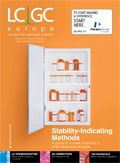Event: ISC 2014: The Sound of Chromatography
Event: ISC 2014: The Sound of Chromatography
As Mozart's birthplace, Salzburg, Austria, is well-known for its connections to classical music. However, on 14–18 September it will become host to the 30th International Symposium on Chromatography (ISC 2014) attracting chromatographers from around the world. ISC 2014 is a major liquid chromatography/gas chromatography LC/GC) conference that was first held in 1956 in London, and since then has been held biannually in various European cities.
Chromatography in its various forms has become an eminently powerful analytical technique that is now indispensable for combating challenges in fields such as metabolomics, proteomics, pharmaceutical analysis, food control, environmental analysis, clinical chemistry, and doping control. Hyphenation with sophisticated mass spectrometric detection has led to the possibility of identification of unknown analytes with quantitation limits in a range that was beyond reach only a few years ago. Gas chromatography–mass spectrometry (GC–MS) and liquid chromatography–mass spectrometry (LC–MS) technologies now represent a gold standard for analysis methods.
Progress in chromatography will always be an interplay between academic research performed at universities and the production of sophisticated and reliable instrumentation by manufacturers. Some may remember that sub-2 μm particles were investigated decades ago as stationary phases for LC, but dedicated ultrahigh-pressure liquid chromatography (UHPLC) instrumentation only became commercially available in 2005. Monolith-type stationary phases and core–shell particles have been developed, highlighting the continuous advances in column and instrument technology that are occurring. Similarly, supercritical fluid chromatography (SFC) has been the focus of research for many years, but its acceptance by chromatographers was quite slow until recently when a new generation of SFC instruments started a renaissance of this technique.
ISC 2014 will be a forum for discussing fundamentals, applications, and the latest developments in instrumentation. The internet is an immense source of information for all fields of research, but identifying the most relevant information has become tricky. Personal communication and networking are required more than ever to keep the momentum going. It is important to know the faces behind the names of authors of scientific papers. Personal communication is a prerequisite for progress, as is reflected in the motto of ISC 2014: "Communicating Separation Science for the Future".
A broad knowledge of separation science is required to become an expert and to judge the best option for tackling and solving a given analytical problem. As well as modern LC and GC instruments, it is important not to forget capillary electrophoresis (CE and CE–MS), which can sometimes be a more appropriate approach. The selection of the most suitable analysis methodology depends on the analytical challenge at hand including consideration of the crucial step of sample pre-treatment.
ISC 2014 will cover all aspects of modern separation science, including hyphenation with MS–MS instrumentation, and will, therefore, go beyond the scope of some other conferences that are dedicated to single fields of chromatography. ISC 2014 will provide a "one-stop shop" for analytical chemists and attendants to see a complete picture of current progress. It will bring together a wide range of international scientists from both academia and industry so that attendees can learn the most up-to-date information about theory and practice from each other to accelerate progress in the field.
The abstract submission deadline is 30 April 2014 for oral presentations, and 31 May 2014 for posters.
Attendees at ISC 2014 will enjoy an exceptional scientific meeting in the unique and beautiful cultural surrounds of Salzburg!
Chairpersons: Wolfgang Buchberger, Michael Laemmerhofer, and Wolfgang Lindner
Website: www.isc2014.at E-mail: i.kaehler@cmi.at Tel: +43 (0)512 575 600
11–15 May 2014
41st International Symposium on High Performance Liquid Phase Separations and Related Techniques
Hilton Riverside Hotel, New Orleans, Louisiana, USA
Chair: Michael J. Ramsay
Tel: +1 (301) 668 6001
E-mail: janetbarr@aol.com
Website: www.HPLC2014.org
25–28 May 2014
ExTech2014: 16th International Symposium on Advances in Extraction Technologies
Center of Mediterranean Architecture, Chania, Crete, Greece
Organizers: Technical University of Crete, Greece
Tel: +302821037793
E-mail: extech2014@enveng.tuc.gr
Website: www.extech2014.tuc.gr
9 July 2014
Recent Advances in the Applications of Chromatography–Mass Spectrometry to Environmental Matrix Analysis
The Auditorium, British American Tobacco Group Research and Development, Southampton, UK
Organizers: Environmental Mass Spectrometry Special Interest Group of the BMSS
Tel: +44 (0)161 973 7032
E-mail: PeterBaugh682@hotmail.com
Websites: www.analyticalmethodologycentre.co.uk / www.bmss.org.uk
30 August– 2 September 2014
20th International Symposium on Separation Sciences
Hotel DAP, Prague, Czech Republic
Organizers: The Chromatography and Electrophoresis Group of the Czech Chemical Society
Tel: +420 466 650 618
E-mail: info@isss2014.cz
Website: www.isss2014.cz
Send any event news to Bethany Degg: bdegg@advanstar.com

Regulatory Deadlines and Supply Chain Challenges Take Center Stage in Nitrosamine Discussion
April 10th 2025During an LCGC International peer exchange, Aloka Srinivasan, Mayank Bhanti, and Amber Burch discussed the regulatory deadlines and supply chain challenges that come with nitrosamine analysis.










